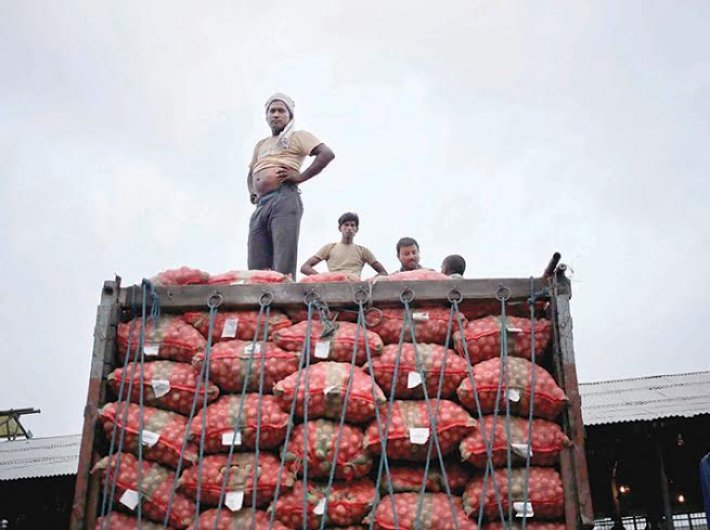Sell produce directly to tame inflation, government tells farmers. Traders call it an improbable idea meant to help big retailers
Something unexpected, if not unprecedented, happened on July 19. Delhi lieutenant-governor Najeeb Jung, in news of late more for animation over the suspended animation of the assembly, issued an order, asking agricultural produce market committee (APMC) mandis in the capital to denotify fruits and vegetables (F&V) from the APMC Act. The L-G asked all concerned to file objections, if any, within 45 days.
Shorn of verbiage, it means once those 45 days are over, and if no plausible objection is raised, farmers need not come or send their products through to such mandis (wholesaler market) – the one at Azadpur in north Delhi being the largest – to sell their produce, as is mandatory now. They can sell them anywhere – lock, stock and barrel.
On the face of it, it should concern few. The move is among many measures taken by the Narendra Modi government to check the burgeoning inflation, which moderated to 8.14 percent in June from 9.50 percent in May. The order follows finance minister Arun Jaitley’s announcement in the budget to liberalise farm produce trading by facilitating direct sale and purchase of crops through farmer markets called ‘kisaan haats’.
This has piqued a section presumed to favour the Bharatiya Janata Party (BJP): Delhi’s traders. While the Congress and other parties have always said the BJP, especially Delhi BJP, has strong backing of the trading community and the APMC governing boards, this move has had this section enraged. Having recently backed the BJP for opposing the Manmohan Singh government’s plans to open up the retail sector to foreign direct investment (FDI), the trader lobby is now bracketing the ruling party with its predecessor.
According to them, the L-G’s move to denotify fruits and vegetables from the APMC Act is part of a bigger scheme to get in FDI in multi-brand retail through the backdoor – by making the local traders ineligible from buying the farm produce at the mandis and thereby forcing farmers to eventually sell their produce to big retail chains who own cold storages.
“Kisaan bechega ki ugayega?”
Most traders Governance Now spoke to said the denotification is likely to disrupt supply of fruits and vegetables in the city once the 45-day deadline is over. Criticising the government for lacking a roadmap, Rajkumar Bhatia, general secretary of the chamber of Azadpur Mandi, accused the administration of being insensitive to lakhs of people employed in the mandis that are governed by APMC Act.
“This ‘kisaan mandi’ is a workable model only if you have a strong processing industry. Brazil, Spain and Germany, for instance, have a standardisation process – farmers there sell their crop to the processing industry and sell the minuscule residue crops in small markets near their farms,” Bhatia said. “But we don’t have such standardisation here. Small farmers can sell their small quantities in nearby localities by bringing the produce in their own small vehicles.
“But what about big farmers? They can’t sell their crop the same day at the same place. It needs to be traded somewhere.”
Pointing out that N Chandrababu Naidu had experimented with Rahto Bazaar in Hyderabad during his earlier tenure as Andhra Pradesh chief minister and the Sheila Dikshit government had started a kisaan haat on Andheria Modh in south Delhi but both had come a cropper, he said the premises are now rented out to Delhi Tourism Development Corporation. No farmer is interested, he stressed: “Kisaan bechega ki ugayega (Will the farmer sell or produce)?” he shot back. “Name one Indian industry that does direct selling. Is it practical, possible? The government needs agents to buy even arms and ammunition. But the same fraternity (traders) becomes an evil agent when you talk of selling and buying farm produce!”
He said APMC mandis, too, have kisaan sheds where farmers can come and sell their produce directly without any intermediaries. “But how many farmers come and sell there?”
Metha Ram Kriplani, president of the Azadpur chamber, said the wholesale market paid nearly '100 crore to the government in the last financial year. He said: “If you do away with buying and selling of F&V in these mandis how do you maintain these mandis without the income it earns from trading them? There are 1 lakh sellers and buyers in Azadpur mandi itself; and then we have labourers and other people working in logistics. What happens to them?
“There would be massive unemployment if the government bans trading of these crops.”
FDI vanguard
Emphasising that they supply to all parts of Delhi, wholesalers (blamed for widening the gap between wholesale and retail prices to as much as 50 percent) warned that consumers will also suffer as a result of this denotification order. “A farmer would only sell close to his area. If F&V is delisted and trading of these items supply is disrupted, where will the vendors buy from?” one trader asked.
Kriplani said: “Rural areas may have ample supply but how would you ensure supply in urban areas? After all, these crops are not produced here. Where will trading take place? The government has not given any roadmap on this.”
Alleging that the government is de-regularising buying and selling of F&V at Delhi mandis to facilitate FDI in multi-brand retail, Kriplani said: “This is a ploy to let domestic and foreign (big) retailers to get into trading of these crops as they expand their business to suburban areas. These retailers have deep pockets and will buy 4-5 acres of land outside metropolises, set up cold storages there and monopolise both urban and suburban markets from there.
“Ultimately the consumers and farmers will suffer.”
Madan Sabnavis, economist at CARE Ratings, said “strategic policy measures” that facilitate direct sale between sellers and buyers are needed to control inflation. “It is easy to say APMC should be revoked. If we do so, where do farmers go and sell their produce? A farmer living 200 km from Pune, for instance, cannot come and sell his produce directly to consumers in the city every day.”
While stressing on cutting the number of intermediaries, Sabnavis maintains that APMC mandis cannot be done away completely. “A farmer can’t own storage facilities to hold his crop throughout the year. So what do you do with seasonal crops?” he asked.
If the Delhi L-G’s decision is implemented, farmers would sell their produce as and when it is plucked or sheared. “There would be glut in the market (at that point) and there would be no supply for rest of the year. The intermediaries make the produce available throughout the year.
Sabnavis is not impressed with the idea of alternative kisaan mandis either. “Until we have structural reforms on infrastructure and logistics side, this would be no different than present mandis,” he said. “If APMC mandis are monopolised by wholesalers, kisaan mandis would be monopolised by big framers, who in a way act like traders. The government seriously needs to bring out a policy on contract framing to reduce small farmer’s cost of production and marketing.”
Some embrace the idea despite doubts, seeking details of the alternate model. Rajendra Sharma, former chairman of APMC Azadpur, said: “There were no mandis before 1977. Then APMC-governed mandis originated and thrived without any competition. Farmers must have more avenues to sell their produce – there must be more competition and denotifying F&V from APMC Act is a step in that direction. But what is the substitute? There is no clarity on this. If F&V is denotified, where and how will the farmers sell their produce? We don’t have kisaan haats yet. How do you ensure cross-area supply?
“The government first needs to do its homework and take all stakeholders along. Prima facie, the order looks to open up farm trading sector to private players. It is designed to pave the way for FDI in multi-brand retail.”
A question of representation
Ajay Jakhar, chairman of Bharat Krishak Samaj, agreed: “Competition in farm trading will help both farmers and consumers. But the issue here is the government has not given a plan B. As a farmer, I would be happy with multiple options to sell my produce, including FDI in multi-brand retail. More the options, more the competition, and that is the essence of free market economy. But it needs to be done diligently.”
Big retailers, including Aditya Birla Retail which buys F&V and other perishable items from Azadpur, refused to comment.
While the Modi government has not yet talked about FDI in multi-brand retail, it is learnt that the commerce ministry is in no mood to subvert the UPA’s decision to allow 51% FDI in the sector, contending that it would send wrong signals to investors. On top of it, it has already thrown the doors open for FDI in defence, railways and insurance in less than two months of coming to power.
The story appeared in the August 1 to 15 issue of the magazine.

